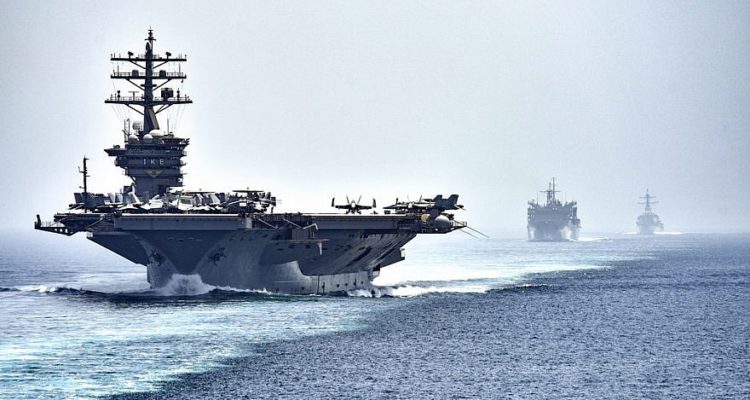Political decisions were made that forced the USS Eisenhower to play sitting duck.
By Daniel Greenfield, Frontpage Magazine
The Biden-Harris administration has spent the past months pressuring Israel into surrendering to Hamas Islamic terrorists and to avoid offending Hezbollah to avoid ‘escalation’.
Now to be fair, this is also the same policy they’ve adopted for America.
After a Houthi attack on an oil tanker led to a leak into the water (mostly ignored or minimized by the same media which went nuts over the Exxon-Valdez spill), we have to ask again why the United States has spent 8 months trying to stop attacks by an Islamic terrorist group of Yemen on naval vessels. Why is it so hard?
The answer, as I wrote before, is that the Biden-Harris administration has banned the Navy from taking pro-active actions against the Iranian-backed terrorist group.
US Navy vessels have spent eight months shooting down missiles and drones aimed at them, sometimes at the last second, but can’t carry the war to the enemy.
Now there’s once again confirmation that this is going on and an explanation of the unsurprising motive.
The U.S. Navy’s Carrier Strike Group Two was instructed to limit large-scale counterstrikes against Houthi rebels in order to avoid upsetting the delicate balance of deterrence with Iran, the CSG’s former commander suggested in an interview released Monday.
USS Dwight D. Eisenhower was in the thick of the counter-Houthi operation from the start, and at its peak, the carrier was launching fighters to up to nine events a day.
Its pilots put in more than 30,000 flight hours and launched more than 60 air-to-air missiles. The destroyer escorts used up so many missiles that they had to set up a pierside resupply operation in nearby Yanbu, Saudi Arabia.
It was all within the crew’s training, Miguez told former Navy commander and Youtuber Ward Carroll – except for the unexpected volume of Houthi unmanned aerial vehicles.
“Just the immense number of UAV interactions that we had, that was something that we did not holistically train to . . . not on the level that we had to encounter in combat,” he said.
Just protecting USS Eisenhower from attack was a significant endeavor. The carrier had at least two fighters up and nearby at all times to carry out air defense.
If it couldn’t have its own fighters in the air, it drew on the resources of the U.S. Air Force, which would dispatch land-based planes to fly an equivalent force-protection mission around the carrier.
Initially, Eisenhower had freedom of movement within the operating area, but as time went on and Houthi attacks became more sophisticated, Miguez had to reposition in order to make the carrier a harder target.
“For force protection, I had to move the carrier multiple times,” he said.
Eisenhower’s crew got to hit back at the Houthi threat with seven large coordinated strikes, working with the Air Force and with allied partners.
“We were definitely degrading their capability,” Miguez said. But the task force was not permitted to bring is full might to bear against all targets.
“There are definite strategies that were put forward, but our National Command Authority decided that those – I would call more aggressive postures and more aggressive strikes – was not something we wanted to challenge,” Miguez said.
“We all know Iranian-backed groups like the Houthis, where that threat’s emanating from . . . And so that is the calculus that’s handled at echelon zero, at the National Command Authority, with NSA, and everybody else. Those are things that I don’t dabble in.”
In short, political decisions were made that forced the USS Eisenhower to play sitting duck because they weren’t allowed to hit the terrorists hard to avoid offending Iran.
The Biden-Harris administration valued the lives of American sailors less than appeasing Iran.





